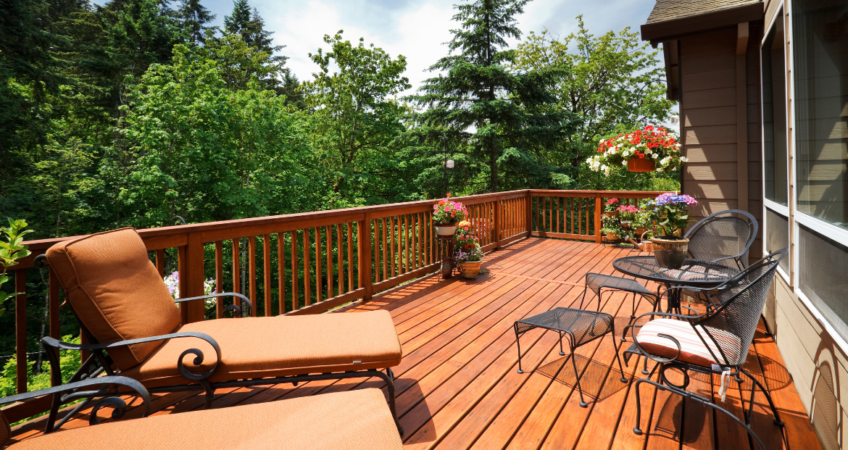Building the perfect deck for your home can transform your outdoor space into a beautiful retreat, ideal for relaxation, dining, and entertaining. But with so many materials, designs, and considerations, it’s easy to feel overwhelmed by the options. This comprehensive guide will help you make informed decisions, whether you’re planning a simple deck or an elaborate outdoor living area.
From selecting the right materials to understanding local regulations, we’ll walk you through everything you need to know to build the perfect deck for your home.
Benefits of Building a Deck for Your Home
Before diving into the details of deck construction, it’s important to understand the benefits of adding a deck to your home:
- Increased Home Value: A well-built deck is a smart investment that can significantly boost your property’s resale value.
- Expanded Living Space: Creates additional areas for relaxation, dining, and entertaining, enhancing your lifestyle.
- Aesthetic Appeal: A beautifully designed deck can enhance the overall look of your home.
- Outdoor Enjoyment: Enjoy the outdoors more comfortably and conveniently.
How to Choose the Right Materials to Build Your Perfect Deck
One of the most important decisions in building the perfect deck for your home is choosing the right material. The material you select will determine the deck’s look, cost, and maintenance requirements.
Let’s explore the most popular options:
1. Wood Decking
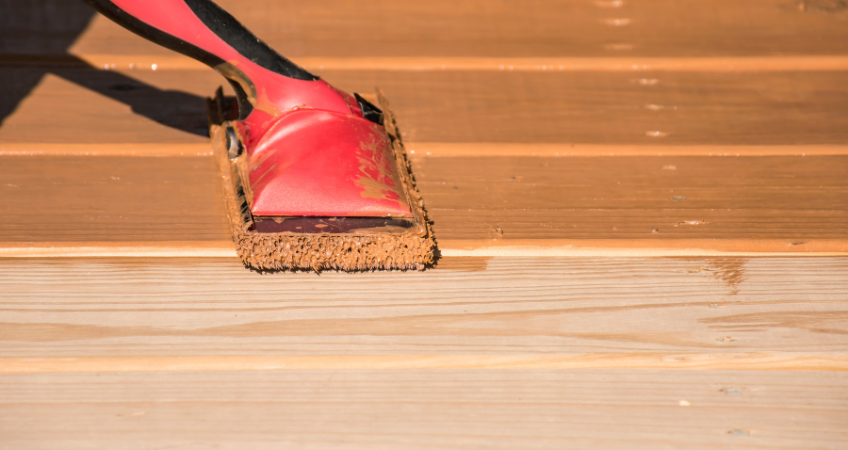
Pros:
- Classic appeal with natural beauty and warmth.
- Can be stained or painted in various colors.
- Cost-effective upfront.
Cons:
- Requires regular maintenance (sealing, staining).
- Prone to rot, splintering, and insect damage over time.
2. Composite Decking
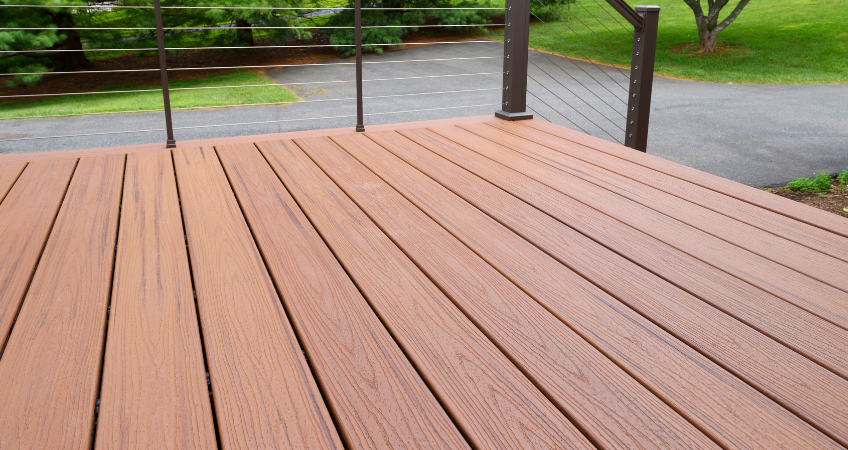
Pros:
- Low maintenance (no staining or sealing required).
- Resistant to rot, insects, and fading.
- Available in a variety of colors and textures.
Cons:
- Higher upfront cost compared to wood.
- Can become hot underfoot in direct sunlight.
3. PVC (Polyvinyl Chloride) Decking
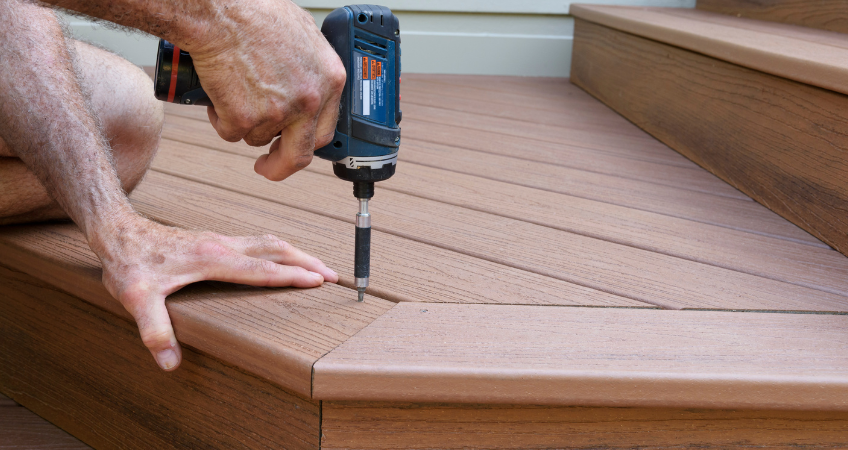
Pros:
- Extremely low maintenance.
- Resistant to moisture, insects, and UV rays.
- Lightweight and easy to install.
Cons:
- Higher cost than both wood and composite.
- Limited color options compared to composite.
4. Aluminum Decking
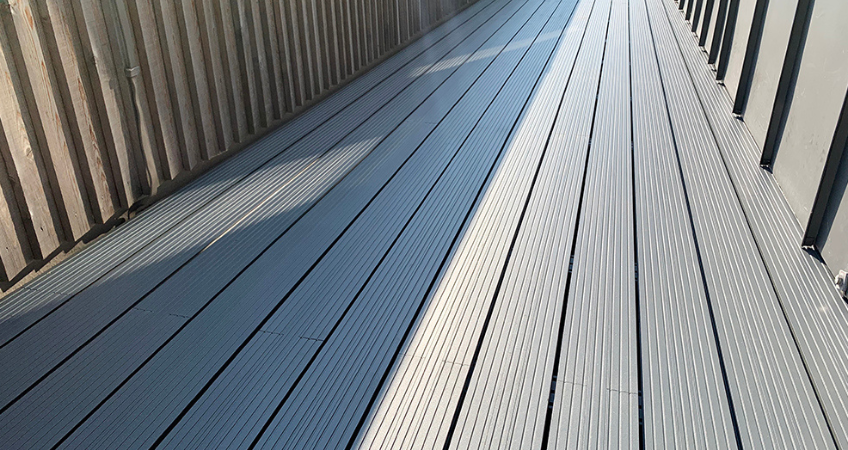
Pros:
- Durable and long-lasting.
- Resistant to rust, rot, and insects.
- Low maintenance.
Cons:
- High upfront cost.
- Industrial look may not appeal to all homeowners.
Designing the Ideal Deck for Your Home: Layout & Features
Once you’ve selected the right material, it’s time to think about the design. Here are some important design elements to consider as you plan how to build the perfect deck for your home:
1. Deck Size and Layout Options
The size of your deck should be in proportion to your home and yard. A larger deck is ideal for hosting gatherings, while a smaller, intimate deck may be perfect for cozy outdoor meals. Consider how you want to use the space and choose a layout that fits your lifestyle.
2. Shape and Structure of Your Deck
Decks come in various shapes—from classic rectangular designs to more intricate multi-level structures. The shape should complement your home’s architectural style and your personal taste.
3. Deck Features and Customization Ideas
Enhance the functionality and beauty of your deck with features such as built-in seating, planters, lighting, and pergolas. These add both practical value and visual appeal to your outdoor space.
4. Choosing the Right Color and Finish for Your Deck
Choose a color and finish that complements your home’s exterior. While natural wood offers a classic look, composite and PVC materials come in a range of colors that can mimic the appearance of wood.
Sustainable Decking Materials
If you’re committed to building the perfect deck for your home with eco-friendly materials, consider the following sustainable options:
1. Recycled Composite Decking
Made from recycled wood fibers and plastic, composite decking is durable, low-maintenance, and helps reduce landfill waste.
2. Bamboo Decking
Bamboo is a fast-growing, renewable resource that is exceptionally durable and moisture-resistant. It is an excellent choice for an environmentally conscious deck.
3. Sustainably Sourced Wood
Look for wood sourced from sustainably managed forests. Certifications like FSC (Forest Stewardship Council) ensure the wood is harvested responsibly.
Deck Maintenance and Durability
Understanding the maintenance requirements of your chosen material is crucial for keeping your deck in top condition. Here’s what you can expect:
- Wood: Requires regular sealing and staining to protect against weather and insects.
- Composite: Requires minimal maintenance, typically just an occasional cleaning with soap and water.
- PVC: Very low maintenance; resistant to stains and easy to clean.
- Aluminum: Requires little upkeep, with occasional washing to remove dirt and debris.
Local Climate Considerations When Building the Perfect Deck
The climate in your area plays a significant role in determining the best deck materials and design. Hot summers, mild winters, and varying levels of humidity may influence your material choice. For example, composite or PVC decking may fare better in areas with high moisture levels, while wood may be perfect for dry climates.
Local Permitting and Regulations for Deck Construction
Before starting your deck construction, it’s crucial to understand the local building codes and permitting requirements. Most regions require a permit to ensure the deck is safe and adheres to zoning laws. This knowledge will give you the peace of mind and confidence that your deck is being built to the highest standards, ensuring the safety and enjoyment of your outdoor space.
Steps to Obtain a Permit:
1. Design Your Deck: Create a detailed plan that includes dimensions, materials, and any additional features.
2. Submit Application: Apply for a building permit through your local building department.
3. Inspection: After construction, schedule an inspection to ensure your deck meets all codes and regulations.
Tips for Choosing the Right Deck Builder to Bring Your Vision to Life
Hiring a professional deck builder can save you time and ensure that your deck is built to last. Here are some tips for selecting the right deck contractor:
- Check Credentials: Ensure the builder is licensed and insured.
- Review Portfolio: Look at previous projects to assess their workmanship and style.
- Read Reviews: Check online reviews and ask for references from past clients.
- Get Multiple Quotes: Obtain quotes from several builders to compare pricing and services.
- Consider Experience with Custom Decks: Choose a builder with a proven track record in constructing custom decks that cater to each homeowner’s style and needs.
- Consult with Experts: At Complex Solutions, our experienced professionals will guide you through the design process, ensuring that your deck not only enhances your outdoor space but also adheres to local regulations and is built to last.
Conclusion: Build the Perfect Deck for Your Home with Confidence
Building the perfect deck for your home is an exciting endeavor that can significantly improve your outdoor living experience. By carefully selecting materials, finishes, and design elements, as well as consulting with experienced professionals, you can create a beautiful and functional deck that complements your home and fits your lifestyle. Whether you want a cozy outdoor retreat or a large space for entertaining, the perfect deck is within reach.
Ready to Start Building Your New Deck? Contact Complex Solutions
If you are located in Charlotte or the surrounding areas, Complex Solutions is here to help bring your deck vision to life. Our expert team is dedicated to creating custom outdoor spaces that you will enjoy for years to come. Contact us today to schedule a consultation and take the first step toward building the perfect deck for your home!

